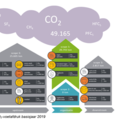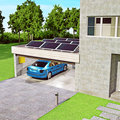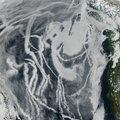Latest News
02 March 2021
TU Delft maps own CO2 emissions in detail

As a ‘climate university’, TU Delft aims to be carbon neutral and circular by 2030. Information regarding CO2 emissions on campus is essential to realising this ambition. The CO2 performance ladder methodology has now been used to map emissions in 2019.
02 March 2021
Measuring system using laser beams and helium bubbles helps top skaters go for gold

TU Delft, NOC*NSF, KNSB and Innovation Lab Thialf have been using the Ring of Fire measuring system to analyse top Dutch speed skaters. The measuring system was used last week in Heerenveen to measure and visualise the air resistance around a moving skater.
26 February 2021
TU Delft increasing study spaces on campus
Studying online places a heavy burden on students. Therefore, TU Delft is looking at various possibilities to enable more physical education and study places on campus. “We realise that for some students it is very difficult to study at home. That is why we are looking at increasing the number of study places on campus” says Rob Mudde, Vice President of Education TU Delft.
22 February 2021
Climate Action Election Debate Thursday 4 March 2021

On 4 March, Studium Generale, in collaboration with GreenTU and the Student Council, is organising the Climate Action Election Debate 2021, with representatives of the political youth parties. During this evening we give the generation that will shape the near future a platform to debate their solution for the climate problem. https://sg.tudelft.nl/event/climate-action-verkiezingsdebat-2021/
10 February 2021
5.7 million euro for hybrid energy storage systems

The Dutch Ministry of Economic Affairs and Climate Policy has allocated 5.7 million euro to FLEXINet. In the upcoming years, the FLEXINet consortium will develop hybrid energy storage systems – capable of storing both heat and electricity. Pavol Bauer, professor at TU Delft and project leader and coordinator: ‘The aim of FLEXINet is a system that accelerates the energy transition. We hope to make a substantial contribution to reaching climate targets by cleverly combining various techniques – think of blending recycled batteries with flexible heat pumps and the charging of electric cars.’
01 February 2021
TU Delft and ASML map non-visible materials at nanoscale with ultrasound

The increasing miniaturisation of electrical components in industry requires a new imaging technique at the nanometre scale. Delft researcher Gerard Verbiest and ASML have developed a first proof-of-concept method that they now plan to further develop.
01 February 2021
Aerosol particles cool the climate less than we thought

De invloed van aerosolen in de atmosfeer op wolken en het klimaat is mogelijk anders dan eerder werd gedacht, concludeert wolkenonderzoeker Franziska Glassmeier.
01 February 2021
TU Delft develops 'brains' for buildings

A large consortium led by TU Delft is going to provide ‘brains’ to buildings. The Dutch Minis-try of Economic Affairs and Climate Policy has allocated 6.9 million euro to the Brains 4 Build-ings project. The objective of the project is to contribute to the development of smart meth-ods and algorithms that add operational intelligence to buildings, in order to make them as energy efficient and comfortable as possible. Professor and scientific coordinator Laure Itard: “Buildings’ energy systems have become so complex that their real time control cannot be achieved by traditional methods. We need much clever approaches using the potential of machine learning and artificial intelligence.”
28 January 2021
Pandemic & Disaster Preparedness Center: facing future disasters well prepared
In today’s edition of the TV show Jinek, Ernst Kuijpers, Marion Koopmans and Ahmed Aboutaleb presented plans for the Pandemic & Disaster Preparedness Center (PDPC) developed by the convergence collaboration between TU Delft, Erasmus University Medical Center (Erasmus MC) and Erasmus University Rotterdam. In this centre, Rotterdam and Delft bring together top scientists in the fields of medicine, engineering (including AI), logistics and sociology. Their ambitious research agenda addresses the extent and the interrelated aspects of future pandemics and disasters. In the Netherlands and around the world, there is an urgent need to better prepare for pandemics and disasters such as the current coronavirus crisis. The knowledge that has been acquired in the Rotterdam area can be applied broadly, which means that the Pandemic & Disaster Preparedness Center will be able to play an important role worldwide in preparing for future disasters and pandemics.
28 January 2021
TU Delft launches new series of TU Delft AI Labs

TU Delft is launching a new series of eight TU Delft AI Labs today. In these labs, scientists are using artificial intelligence (AI) to accelerate scientific progress and help solve societal issues. Another eight labs will be launched later in 2021, bringing the total to 24. In the past year, almost all sixteen of the new Assistant Professor posts opened as part of this programme thus far have been filled. The recruitment of 32 PhD students for the new TU Delft AI Labs will start end of February. In addition, TU Delft will present the labs at the MIT European career fair on 25 February.
